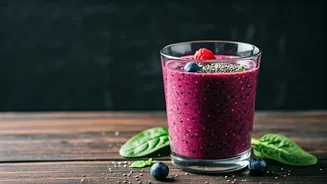Plant-Based Powerhouse
The shift towards a plant-based diet in the fitness world is undeniable, driven by the desire for enhanced performance, quicker recovery, and an ethical
approach to food. Many athletes and fitness enthusiasts are turning to plant-based diets, seeing a remarkable impact on their overall well-being. A thoughtfully designed plant-based diet provides all the necessary nutrients for muscle growth, repair, and optimal function. For those who embrace plant-based eating, they often experience improved digestion, reduced inflammation, and heightened energy levels, all of which are essential for rigorous training regimes. Moreover, this dietary change supports a more sustainable and ethical lifestyle, aligning with the values of many individuals today. The adoption of a plant-based approach does not mean a compromise on athletic prowess; rather, it often results in increased vitality and endurance.
Nutrient Essentials Unpacked
A plant-based diet's success lies in its focus on crucial nutrients that fuel the body. Protein, for instance, is vital for muscle repair and growth, so plant-based eaters should prioritize sources like lentils, tofu, tempeh, quinoa, and various beans. These offer complete protein profiles or can be combined to achieve this. Iron is also significant, as it carries oxygen in the blood, which is vital for energy production; spinach, fortified cereals, and dried fruits are excellent plant-based iron sources. Vitamin B12 is another crucial element because it is often lacking in plant-based diets, so supplementation or fortified foods are recommended to avoid deficiencies. Calcium is essential for bone health, and plant-based individuals can get this through fortified plant milks, leafy greens, and tofu. Moreover, omega-3 fatty acids, important for heart and brain health, can be obtained from flaxseeds, chia seeds, and walnuts. Ensuring a varied diet with a focus on nutrient-dense plant foods allows plant-based athletes to meet their nutritional needs effectively.
Crafting Meal Strategies
Efficient meal planning and strategic food choices are essential for athletes following a plant-based diet. Meal prep is a game-changer, helping to save time and ensure consistent intake of essential nutrients. Start by preparing large batches of grains like brown rice or quinoa, and legumes like lentils or chickpeas, which serve as versatile base ingredients. Incorporating a variety of colorful fruits and vegetables provides vital vitamins, minerals, and antioxidants, and also adds flavor. Combining different protein sources throughout the day creates complete amino acid profiles. Think of pairing quinoa with black beans, or tofu with brown rice and vegetables. Including healthy fats from avocados, nuts, and seeds provides energy and supports overall health. Snack smart with options like nuts, seeds, and fruit, which keep energy levels stable during training. Always hydrate properly, ensuring adequate water intake to support performance and recovery. A well-structured meal plan, combined with conscious food choices, supports the demands of training and provides the necessary nutrients for peak performance.
Boosting Performance Naturally
Plant-based diets often offer performance benefits through various mechanisms. The focus on whole foods reduces inflammation, promoting faster recovery after intense workouts. This contrasts with diets high in processed foods, which can increase inflammation and hinder recovery. Plant-based diets typically include a high intake of fiber, which promotes healthy digestion and maintains stable blood sugar levels, preventing energy crashes. The emphasis on antioxidants, found abundantly in fruits and vegetables, can fight oxidative stress caused by exercise, and speed up recovery. For endurance athletes, the increased intake of carbohydrates from plant sources provides sustained energy levels, which supports longer and more intense training sessions. Many plant-based athletes report improved endurance, faster recovery times, and increased overall energy levels. However, athletes should monitor their nutrient intake and adjust their diet as needed, consulting with a registered dietitian or nutritionist to optimize their plan and address any individual needs. The overall goal is to tailor the diet to support the body, allowing it to perform at its best and achieve fitness goals effectively.
Overcoming Dietary Challenges
Transitioning to a plant-based diet requires awareness and planning to address potential challenges. One key area is ensuring adequate protein intake, particularly for athletes with high demands. A variety of plant-based protein sources, or the use of protein supplements like pea protein or soy protein isolate, can solve this. Another aspect is iron deficiency, which is more common among plant-based eaters. Consuming iron-rich foods with vitamin C boosts iron absorption. Supplementation may be necessary, and regular blood tests help to monitor iron levels. Vitamin B12 is essential and not naturally present in most plant-based foods, therefore supplementation is crucial. Careful attention to calcium intake, as well as considering a supplement, supports bone health. Addressing these potential deficiencies ensures that all nutritional requirements are met, thus avoiding any negative effects on performance. Planning meals and consulting with a healthcare professional can help develop a well-rounded and effective plant-based dietary approach, allowing athletes to thrive.














